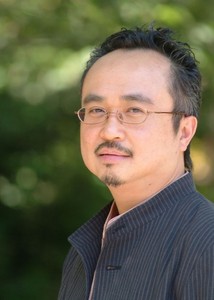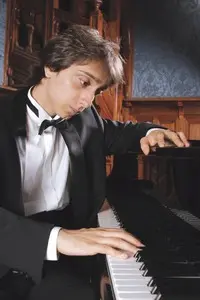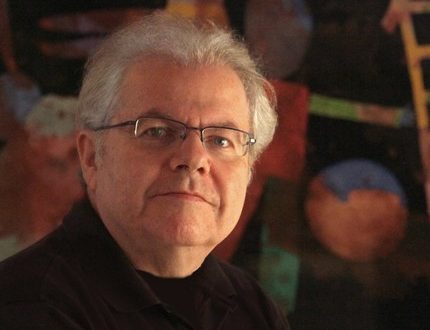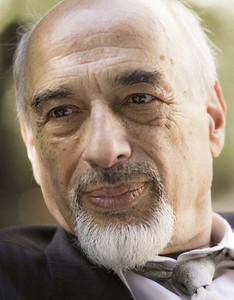
Dmitry Bashkirov (Dmitri Bashkirov) |
Dmitri Bashkirov

Many of the young musicians who met in the early fifties at the Moscow Conservatory probably remember the first appearance in the classroom corridors of a swarthy, thin young man with impetuous movements and lively facial expressions on a mobile, expressive face. His name was Dmitry Bashkirov, his comrades soon began to call him simply Delik. Little was known about him. It was said that he graduated from the Tbilisi ten-year music school under Anastasia Davidovna Virsaladze. Once, at one of the exams, Alexander Borisovich Goldenweiser heard him – he heard, was delighted and advised him to complete his education in the capital.
Goldenweiser’s new pupil was very talented; looking at him – a direct, rare emotional person – it was not difficult to notice: so passionately and selflessly, with such generous self-giving, only truly gifted natures can react to the environment like him …
Dmitry Aleksandrovich Bashkirov became widely known as a concert performer over the years. Back in 1955, he received the Grand Prix at the M. Long – J. Thibault competition in Paris; this launched his stage career. He now has hundreds of performances behind him, he was applauded in Novosibirsk and Las Palmas, Chisinau and Philadelphia, in small Volga cities and large, world famous concert halls. Time has changed a lot in his life. Much less in his character. He, as before, is impulsive, as if quicksilver is changeable and fast, every minute he is ready to get carried away with something, to catch fire …
The properties of the Bashkir nature, which were mentioned, are clearly visible in his art. The colors of this art have not faded and faded over the years, have not lost their richness, intensity, iridescence. The pianist’s playing, as before, excited; otherwise, how could she worry? Perhaps there was no case for anyone to reproach Bashkirov the artist for indifference, spiritual apathy, satiety with creative search. For this, he is too restless as a person and an artist, constantly burning with some kind of unquenchable inner fire. This may be the reason for some of his stage failures. Undoubtedly, on the other hand, it is precisely from here, from the creative restlessness and most of his achievements.
On the pages of the music-critical press, Bashkirov is often called a romantic pianist. Indeed, he clearly represents modern romanticism. (V. V. Sofronitsky, talking with V. Yu. Delson, dropped: “After all, there is also modern romanticism, and not only romanticism of the XNUMXth century, do you agree?” (Memories of Sofronitsky. S. 199.)). Whatever composer Bashkirov interprets – Bach or Schumann, Haydn or Brahms – he feels the music as if it were created today. For concert-goers of his type, the author is always a contemporary: his feelings are experienced as his own, his thoughts become his own. There is nothing more alien to these concertgoers than stylization, “representation”, a fake for archaic, a demonstration of a museum relic. This is one thing: the musical sensation of the artist our era, наших days. There is something else, which also allows us to speak of Bashkirov as a typical representative of contemporary performing arts.
He has precise, masterfully crafted pianism. It used to be believed that romantic music-making is unbridled impulses, spontaneous outbursts of feelings, an extravaganza of brightly colorful, albeit somewhat shapeless sound spots. Connoisseurs wrote that romantic artists gravitate towards “vague, iridescent, illegible and foggy”, that they are “far from jewelry drawing of trifles” (Martins K. A. Individual piano technique. – M., 1966. S. 105, 108.). Now times have changed. Criteria, judgments, tastes have been modified. In the age of inexorably strict gramophone recording, radio and television broadcasts, sound “nebulae” and “vagueness” are not forgiven by anyone, to anyone and under any circumstances. Bashkirov, a romantic of our days, is modern, among other things, by the careful “made” of his performing apparatus, the skillful debugging of all its details and links.
That is why his music is good, requiring unconditional completeness of the external decoration, “jewelry drawing of trifles”. The list of his performing successes is opened by such things as Debussy’s preludes, Chopin’s mazurkas, “Fleeting” and Prokofiev’s Fourth Sonata, Schumann’s “Colored Leaves”, Fantasia and F-sharp-minor novelette, much from Schubert, Liszt, Scriabin, Ravel. There are many interesting things that attract listeners in his classical repertoire – Bach (F-minor concerto), Haydn (E-flat major sonata), Mozart (concerts: Ninth, Fourteenth, Seventeenth, Twenty-fourth), Beethoven (sonatas: “Lunar” , “Pastoral”, Eighteenth, concerts: First, Third, Fifth). In a word, everything that wins in Bashkirov’s stage transmission is where in the foreground there is an elegant and clear sound pattern, an elegant chasing of instrumental texture.
(Earlier it was said that those who play the piano, like painters, use different techniques of “writing”: some like a sharpened sound pencil, others like gouache or watercolor, and still others like heavy-pedal oil paints. Bashkirov is often associated with a pianist-engraver: thin sound pattern on a bright emotional background…)
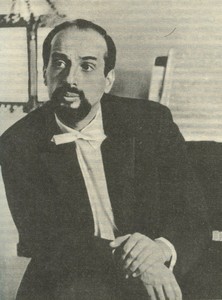
Like many truly gifted people, Bashkirov happens to be changed by creative happiness. He knows how to be self-critical: “I think I succeeded in this play,” you can hear from him after the concert, “but this one is not. The excitement got in the way … Something “shifted”, turned out to be out of “focus” – not the way it was intended. It is known that excitement interferes with everyone – debutants and masters, musicians, actors and even writers. “The minute when I myself am most excited is not the one when I can write things that touch the viewer,” Stendhal admitted; he is echoed in this by many voices. And yet, for some, excitement is fraught with great hindrances and troubles, for others, less. Easily excitable, nervous, expansive natures have a harder time.
In moments of great excitement on the stage, Bashkirov, in spite of his will, speeds up the performance, falls into some excitement. This usually happens at the beginning of his performances. Gradually, however, his playing becomes normal, sound forms gain clarity, lines – confidence and accuracy; with an experienced ear, one can always catch when a pianist manages to bring down a wave of excessive stage anxiety. An interesting experiment was set up by chance at one of Bashkirov’s evenings. He played the same music twice in a row – the finale of Mozart’s Fourteenth Piano Concerto. The first time – a little hastily and excitedly, the second (for an encore) – more restrained in pace, with more calmness and self-control. It was interesting to observe how the situationminus excitement“transformed the game, gave a different, higher artistic result.
Bashkirov’s interpretations have little in common with the usual stencils, familiar performance samples; this is their obvious advantage. They can be (and are) controversial, but not colorless, too subjective, but not insipid. At the concerts of the artist, it is almost impossible to meet indifferent people, he is not addressed with those polite and insignificant praises that are usually bestowed on mediocrity. Bashkirov’s art is either accepted warmly and enthusiastically, or, with no less fervor and interest, they discuss with the pianist, disagreeing with him in some ways and disagreeing with him. As an artist, he is familiar with the creative “opposition”; in principle, this can and should be credited.
Some say: in Bashkirov’s game, they say, there is a lot of external; he is sometimes theatrical, pretentious… Probably, in such statements, apart from quite natural differences in tastes, there is a misunderstanding of the very nature of his performance. Is it possible not to take into account the individual typological features of this or that artistic | personality? Bashkirov the concertant – such is his nature – always effectively “looked” from the outside; brightly and brightly revealed himself in the external; what would be a stage show-off or a strumming for another, he has only an organic and natural expression of his creative “I”. (The world theater remembers Sarah Bernhardt with her almost eccentric stage manners, remembers the modest, sometimes inconspicuous outwardly Olga Osipovna Sadovskaya – in both cases it was real, great art.) lead into a distant, almost indistinguishable subtext. If we are to take the position of a critic, then rather on a different occasion.
Yes, the art of the pianist gives the audience open and strong emotions. Great quality! On the concert stage, you often encounter a shortage of it, rather than an excess. (Usually they “fall short” in the manifestation of feelings, and not vice versa.) However, in his psychological states – ecstatic excitement, impulsiveness, etc. – Bashkirov was sometimes, at least earlier, somewhat uniform. One can cite as an illustration his interpretation of Glazunov’s B flat minor sonata: it happened to lack epic, breadth. Or the Second Concerto of Brahms – behind the dazzlingly bright fireworks of passions, in past years, the artist’s introspective reflection was not always felt in it. From Bashkirov’s interpretations there was a red-hot expression, a current of high nervous tension. And the listener sometimes began to feel a craving for modulations into some other, more distant emotional tonalities, into other, more contrasting spheres of feelings.
However, talking now about earlier the former. People who are well acquainted with Bashkirov’s performing arts constantly find changes, shifts, and interesting artistic transformations in him. Either one can see the selection of the artist’s repertoire more accurate, or previously unfamiliar methods of expressiveness are revealed (in recent years, for example, the slow parts of classical sonata cycles have somehow sounded especially clean and soulful). Undoubtedly, his art is enriched with new discoveries, more complex and varied emotional nuances. This could be seen, in particular, in Bashkirov’s performance of the concertos by K.F.E. , Fantasia and Sonata in C minor by Mozart, piano version of the Violin Concerto, Op. 1987 by Beethoven, etc.)
Bashkirov is a great conversationalist. He is naturally inquisitive and inquisitive; he is interested in many things; today, as in his youth, he looks closely at everything connected with art, with life. In addition, Bashkirov knows how to clearly and clearly formulate his thoughts – it is no coincidence that he published several articles on the problems of musical performance.
“I have always said,” Dmitry Alexandrovich once remarked in a conversation, “that in stage creativity the main and most important thing is determined by the very warehouse of the artist’s talent – his individual personal characteristics and properties. It is with this that the performer’s approach to certain artistic phenomena, the interpretation of individual works, is connected. Critics and part of the public, sometimes, do not take this circumstance into account – judging the artist’s game abstractly, based on how they by the I would love to hear the music being played. This is completely false.
Over the years, I generally believe less and less in the existence of some frozen and unambiguous formulas. For example – how it is necessary (or, on the contrary, not necessary) to interpret such and such an author, such and such an essay. Practice shows that performance decisions can be very different and equally convincing. Although this does not mean, of course, that the artist has the right to self-will or stylistic arbitrariness.
Another question. Is it necessary at the time of maturity, having 20-30 years of professional experience behind him, to play the piano? morethan in youth? Or vice versa – is it more reasonable to reduce the intensity of workloads with age? There are different views and points of view on this. “It seems to me that the answer here can only be purely individual,” believes Bashkirov. “There are performers whom we call born virtuosos; they certainly need less effort to keep themselves in good performing shape. And there are others. Those who have never been given anything just like that, of course, without effort. Naturally, they have to work tirelessly all their lives. And in later years even more than in youth.
Actually, I must say that among the great musicians, I almost never met those who, over the years, with age, would weaken their demands on themselves. Usually the opposite happens.”
Since 1957, Bashkirov has been teaching at the Moscow Conservatory. Moreover, over time, the role and importance of pedagogy for him is increasingly increasing. “In my youth, I often flaunted that, they say, I had time for everything – both teaching and preparing for concert performances. And that one is not only not a hindrance to the other, but perhaps even vice versa: one supports, reinforces the other. Today, I would not argue this … Time and age still make their own adjustments – you can’t evaluate something differently. Nowadays, I tend to think that teaching creates certain difficulties for concert performance, limits it. Here is a conflict that you are constantly trying to resolve and, unfortunately, not always successfully.
Of course, what has been said above does not mean that I question the necessity or expediency of pedagogical work for myself. No way! It has become such an important, integral part of my existence that there are no dilemmas about it. I’m just stating the facts as they are.”
Currently, Bashkirov gives about 55 concerts per season. This figure is quite stable for him and has practically not changed for a number of years. “I know there are people who perform much more. I don’t see anything surprising in this: everyone has different reserves of energy, endurance, physical and mental strength. The main thing, I think, is not how much to play, but how. That is, the artistic value of performances is important first of all. For the feeling of responsibility for what you do on the stage is constantly growing.
Today, continues Dmitry Aleksandrovich, it is very difficult to occupy a worthy place on the international musical and performing scene. Need to play often enough; play in different cities and countries; run various programs. And, of course, give it all. at a fairly high professional level. Only under such conditions, the artist, as they say, will be in sight. Of course, for someone who is engaged in pedagogy, this is more difficult than for a non-teacher. Therefore, many young concertgoers essentially ignore teaching. And somewhere they can be understood – given the ever-increasing competition in the artistic world … “
Returning to the conversation about his own pedagogical work, Bashkirov says that in general he feels completely happy in it. Happy because he has students, creative communication with which brought him – and continues to deliver – great joy. “If you look at the best of them, you must admit that the path to fame was not strewn with roses for anyone. If they have achieved anything, it is mostly through their own efforts. And the ability to creative self-development (which I consider the most important for a musician). My artistic viability they proved not by the serial number at this or that competition, but by the fact that they play today on the stages of many countries of the world.
I would like to say a special word about some of my students. Quite briefly. Literally in a few words.
Dmitry Alekseev. I like it in it internal conflictwhich I, as his teacher, know well. Conflict in the best sense of the word. It may not be very visible at first sight – rather hidden than conspicuous, but it exists, exists, and this is very important. Alekseev is clearly aware of his strengths and weaknesses, he understands that the struggle between them and means moving forward in our profession. This movement can flow with him, like with others, smoothly and evenly, or it can take the form of crises and unexpected breakthroughs into new creative spheres. It doesn’t matter how. It is important that the musician goes forward. About Dmitry Alekseev, it seems to me, this can be said without fear of falling into exaggeration. His high international prestige is not accidental.
Nikolai Demidenko. There was a somewhat condescending attitude towards him at one time. Some did not believe in his artistic future. What can I say about this? It is known that some performers mature earlier, faster (sometimes they even mature too quickly, like some of the geeks who burn out for the time being, for the time being), for others this process proceeds more slowly, more calmly. It takes years for them to fully develop, mature, stand on their own feet, bring out the best that they have… Today, Nikolay Demidenko has a rich practice, he plays a lot in various cities of our country and abroad. I don’t get to hear him very often, but when I go to his performances, I see that a lot of things he does now are not quite the same as before. Sometimes I almost do not recognize in his interpretation of those works that we passed in the class. And for me, as a teacher, this is the biggest reward …
Sergey Erokhin. At the VIII Tchaikovsky Competition, he was among the laureates, but the situation at this competition was very difficult for him: he had just demobilized from the ranks of the Soviet Army and, naturally, was far from his best creative form. In the time that has passed since the competition, Sergei has made, it seems to me, very great success. Let me remind you at least of his second prize at a competition in Santander (Spain), about which one of the influential Madrid newspapers wrote: “Sergey Erokhin’s performances were worth not only the first prize, but the entire competition.” In short, I have no doubt that Sergei has a bright artistic future. Moreover, he was born, in my opinion, not for competitions, but for the concert stage.
Alexander Bonduryansky. He devoted himself entirely to chamber music. For a number of years, Alexander has been performing as part of the Moscow Trio, cementing it with his will, enthusiasm, devotion, dedication, and high professionalism. I follow his activities with interest, I am convinced again and again how important it is for a musician to find his own way. I would like to think that the starting point of Bonduryansky’s interest in chamber ensemble music-making was his observation of my joint creative work in a trio with I. Bezrodny and M. Khomitser.
Eiro Heinonen. At home, in Finland, he is one of the most famous pianists and teachers (now he is a professor at the Sibelius Academy in Helsinki). I remember with pleasure my meetings with him.
Dang Thai Sean. I studied with him when he was a graduate student at the Moscow Conservatory; met with him later. I had extremely pleasant impressions from contacts with Sean – a person and an artist. He is smart, intelligent, charming and amazingly talented. There was a time when he experienced something like a crisis: he found himself in a closed space of a single style, and even there he sometimes looked not very diverse and multifaceted … Sean largely overcame this crisis period; the depth of performing thinking, the scale of feelings, the drama appeared in his playing … He has a magnificent pianistic present and, no doubt, no less enviable future.
There are other interesting, promising young musicians in my class today. But they are still growing. Therefore, I will refrain from talking about them.
Like every talented teacher, Bashkirov has his own style of working with students. He does not like to turn to abstract categories and concepts in the classroom, he does not like to go far away from the work being studied. Infrequently uses, in his own words, parallels with other arts, as do some of his colleagues. He proceeds from the fact that music, the most universal of all art forms, has its own laws, its own “rules”, its own artistic specificity; therefore, attempts to lead the student to a purely musical solution through the sphere non-musical are somewhat artificial. As for analogies with literature, painting, etc., they can only give an impetus to understanding the musical image, but not replace it with something else. It happens that these analogies and parallels even cause some damage to music – they simplify it … “I think it’s better to explain to the student what you want with the help of facial expressions, a conductor’s gesture and, of course, a live display on the keyboard.
However, you can teach this way and that way… Again, there cannot be a single and universal formula in this case.”
He constantly and persistently returns to this thought: there is nothing worse than bias, dogmatism, one-dimensionality in the approach to art. “The world of music, in particular performance and pedagogy, is infinitely diverse. Here, the most diverse areas of value, artistic truths, and specific creative solutions can and must fully coexist. It happens that some people argue like this: I like it – it means it’s good; If you don’t like it, then it’s definitely bad. Such, so to speak, logic is deeply alien to me. I try to make it alien to my students as well.”
… Above, Bashkirov spoke about the internal conflict of his student Dmitry Alekseev – conflict “in the best sense of the word”, which “means moving forward in our profession.” Those who know Dmitry Alexandrovich closely will agree that, first of all, such conflict is noticeable in himself. It was she who, combined with captious strictness towards himself (Once, 7-8 years ago, Bashkirov said that he used to give himself something like marks for performances: “Points, to tell the truth, are usually low … In a year you have to give dozens of concerts. I am truly satisfied at best with a few … “In this connection, an episode involuntarily comes to mind, which G. G. Neuhaus liked to recall:” Leopold Godovsky, my glorious teacher, once told me: “I gave in this season 83 concerts, and you know how many I was pleased with? – three! (Neigauz G. G. Reflections, memories, diaries // Selected articles. Letters to parents. P. 107).) – and helped him become one of the most prominent figures in pianism of his generation; it is she who will bring the artist, there is no doubt, many more creative discoveries.
G. Tsypin, 1990



